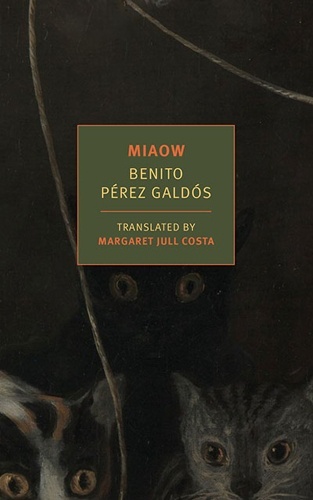Miaow

Editorial New York Review Of Books
Fecha de edición junio 2025 · Edición nº 1
Idioma inglés
EAN 9781681379470
Libro
encuadernado en tapa blanda
Resumen del libro
A Dickensian tale of ambition, family, and financial ruin by the most important Spanish novelist after Cervantes, this tragicomic novel about a patriarch struggling to keep his ungrateful family from ruin is at turns scathing and hilarious.Ramoacuten Villaamil has been a loyal civil servant his whole life, but a change in government leaves him out of a job and still two months short of qualifying for his pension. Initially optimistic that hell be able to find work and pull his family out of their financial straits, he spends his days visiting the Administration, pestering his ex-colleagues to put in a good word for him, and begging his friends in high places for money. At home, Villaamils wife, daughter, and sister-in-lawwhose feline appearances earn them the nickname the Miaowsare unimpressed by Villaamils failures, and the only joy left in Villaamils life is his young grandson Luis. When Luiss disgraced father, the handsome and dastardly Viacutector Cadalso reappears in their lives with promises of easing their financial burdens, Villaamil has no choice but to allow him back into their midst, even as he knows there is nothing pure about Viacutectors intentions, and that his return could bring them all to ruin.Comparable to the best of Balzac and Dickens, Benito Prez Galdoacutess satire of lower middle-class life offers a scathing critique of the hypocrisy and corruption within nineteenth-century Spanish society as well as a potent exploration of the value of human life outside of work. Margaret Jull Costas inimitable translation captures all the tragicomic vitality of Prez Galdoacutess prose, and proves that he is indeed the best Spanish writer of the nineteenth century Mario Vargas Llosa.
Biografía del autor
Benito Pérez Galdós nació en Gran Canaria en 1843. Con veinte años viajó por Europa como corresponsal y a la vuelta tradujo a Dickens a partir de las ediciones francesas. En 1873 empezó a publicar los Episodios Nacionales, obra que le granjeó una inmensa popularidad y que continuaría escribiendo a lo largo de cinco series y a la par que novelas como Fortunata y Jacinta (1887), Miau (1888), Tristana (1892), Misericordia (1897), El abuelo (1897), Casandra (1905), El caballero encantado (1909; Nocturna, 2024) y La razón de la sinrazón (1915). En 1897 fue nombrado miembro de la Real Academia de la Lengua Española. Colaboró con diversos medios de comunicación y perteneció al Partido Progresista de Sagasta, al Partido Republicano y a la Conjunción Republicano-Socialista (con este último, fue diputado en las Cortes en las legislaturas de 1907 y 1910). En 1912 fue propuesto para el Premio Nobel de Literatura y un año después se quedó ciego. Murió en Madrid en 1920.








